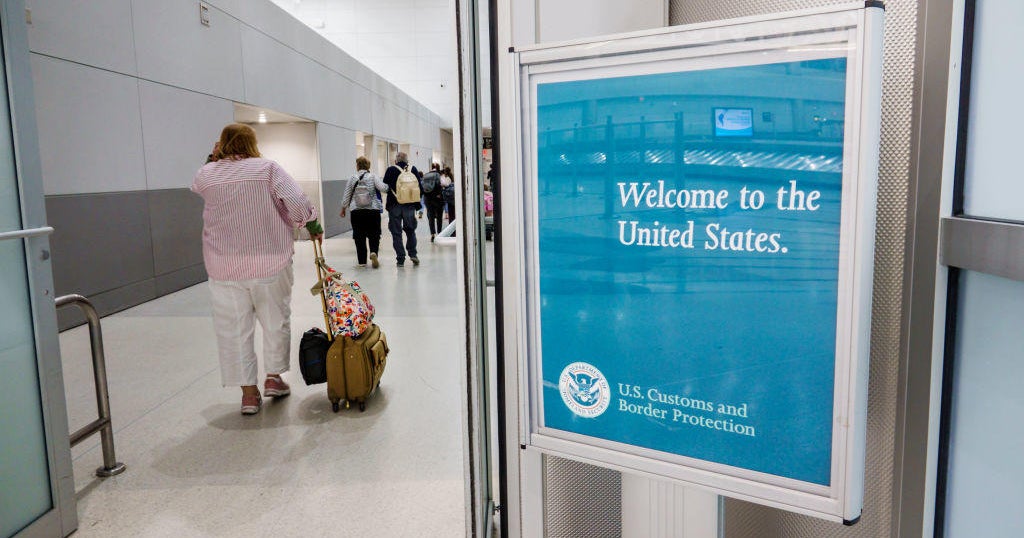Senators renew scrutiny of border officers searching Americans’ phones

United States
Breaking News:
Washington DC
Tuesday, May 7, 2024


Washington — A group of senators is pressing Homeland Security Secretary Alejandro Mayorkas for more information on border officers’ broad authority to search travelers’ phones and other electronic devices without a warrant or suspicion of a crime, renewing scrutiny of whether the U.S. government is infringing on Americans’ Fourth Amendment rights against unreasonable searches and seizures.
In a letter sent to Mayorkas on Thursday, top Democrats and Republicans on the Senate Homeland Security and Senate Finance committees asked the department to brief their staff within the next two weeks on what data is retained from these searches and how the U.S. government is using the data.
“We are concerned that the current policies and practices governing the search of electronic devices at the border constitute a departure from the intended scope and application of border search authority,” Sens. Gary Peters of Michigan, Rand Paul of Kentucky, Ron Wyden of Oregon and Mike Crapo of Idaho wrote in the four-page letter, referring to an exception to the Fourth Amendment.
The ability of Customs and Border Protection and Immigration and Customs Enforcement to inspect devices at the country’s border crossings, airports and seaports “without a warrant, and under different legal standards than those applicable to law enforcement agencies without border search authority, is distinct,” the senators said. CBP and ICE are both agencies within DHS.
DHS did not respond to a request for comment.
CBP defended the longstanding practice as essential to protecting national security in a 2018 directive that established guidelines for the searches. Without probable cause to seize a person’s device and copy its data, the agency “may retain only information relating to immigration, customs and/or other enforcement matters,” it said.
The guidelines permit officers to conduct a “basic search” without a warrant or any suspicion that the traveler has committed a crime. Those searches include manually scrolling through a person’s contacts, call logs, messages, photos, videos, calendar entries and audio files, according to a CBP analysis. But anyone who refuses to hand over their devices with the passcodes can have them seized for days.
If there is “reasonable suspicion of activity in violation of the laws” or “a national security concern,” officers can conduct an “advanced search,” with approval from a supervisor, and copy the contents of the device, the directive said. The information is then stored in a database known as the Automated Targeting System, according to the analysis.
Between October 2018 and March 2024, CBP conducted more than 252,000 searches, a tiny fraction of the hundreds of millions of travelers processed at U.S. ports of entry, according to the agency, which does not specify how many devices had their data uploaded to the database.
Senators have asked Mayorkas for a breakdown of the inspections from the last five years and whether any were conducted with a warrant, with consent from the traveler or pursuant to the “national security concern” exemption. They also want to know how many U.S. citizens, legal permanent residents and non-U.S. persons had their devices searched.
The letter includes a number of questions about how the data is retained, for how long, if searches are influenced by outside agencies who would otherwise be required to obtain a warrant and whether searches of the database are tracked.
The senators also noted that a document that is given to travelers to inform them of the search process “does not clearly state whether travelers have the right to refuse consent for the search without legal penalty, other than device detention.”
Wyden and Paul introduced legislation in 2021 that would have required border officials to obtain a warrant before searching a device, but it never made it out of the Senate Judiciary Committee.
In 2022, Wyden slammed CBP for “allowing indiscriminate rifling through Americans’ private records.” After a CBP briefing, Wyden said travelers had been pressured to unlock their devices without being informed of their rights and the contents of their phones had been uploaded to the database, where it is saved for 15 years and accessible to 2,700 DHS personnel.
CBP told Wyden in response that it “conducts border searches of electronic devices in accordance with statutory and regulatory authorities, as well as applicable judicial precedent.”
Caitlin Yilek is a politics reporter at cbsnews.com and is based in Washington, D.C. She previously worked for the Washington Examiner and The Hill, and was a member of the 2022 Paul Miller Washington Reporting Fellowship with the National Press Foundation.